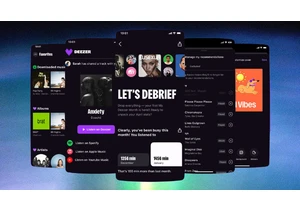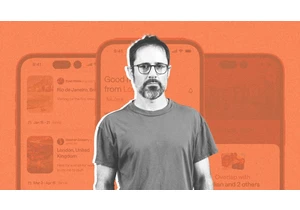Every “first” since the start of the pandemic comes with an extra dose of excitement, as well as anxiety. For me, last week included plenty of both. It was the first time I travelled on an airplane, and the first time I crossed an international border, since early 2020. I was headed to Web Summit in Lisbon, Portugal, the fifth time I was attending Europe’s largest tech conference. (The organizers covered my travel expenses in exchange for me moderating some panels.) There was the excitement of reuniting with colleagues and friends, presenting on stage in front of a live audience, and conducting interviews face-to-face, rather than over Zoom. There was also the anxiety that comes from airport and conference screenings and health checks, regular COVID-19 testing, and the general uneasiness of wading through crowds at a packed conference center after nearly two years of social distancing. Other major tech industry events in recent months—such as IBM Think, SAP’s Sapphire Now, and Salesforce’s Dreamforce—were moved to a virtual or mostly-virtual format, making Web Summit the first major in-person tech event since the pandemic began. Before the end of January the tech industry will gather in person again at events like AWS re:Invent and CES in Las Vegas, and the JP Morgan Chase Annual Health Care Conference in San Francisco. If Web Summit is any indication of what’s to come, attendees should expect a little extra discomfort—and excitement—in the months ahead. Fewer attendees—but still lots of them This year, Web Summit brought more than 40,000 conference goers to the Portuguese capital, marking a significant decrease from the more than 70,000 who attended in 2019. But since the venue was also scaled down a bit, the reduced attendance was hardly felt. Attendees were told to arrive with proof of vaccination or a recent negative COVID-19 test (or both for those without valid European COVID-19 vaccination credentials), though security didn’t check those credentials too thoroughly. Attendees were also required to wear a mask at all times unless eating or drinking, a loophole that seemed to grow wider as the conference wore on. Though the lowered attendance indicates that a fair percentage of Web Summit regulars weren’t ready to return in person, the show represented a networking opportunity that some entrepreneurs found too important to pass up, despite ongoing health and safety concerns. Taking advantage of that opportunity, however, did come with a certain degree of implied risk. A single positive test result among the thousands of participants could have far-reaching implications for those they interacted with, such as work disruptions, quarantine requirements, and not being able to fly home on schedule. “If you’re coming to a 40,000-person conference, there’s an expectation that you’re going to mingle, and there’s going to be a lot of people everywhere,” says Nicole Baker, the cofounder of Biologit, an Ireland-based AI platform that helps drug makers identify adverse reactions to their products. “If you’re a well-established company that’s not selling anything new, maybe [avoid events for now], but if you’re a startup and you’ve developed during the pandemic, you need to go out and meet people, because you need to promote your company,” added Baker’s cofounder, Bruno Ohana.
I’m at Web Summit in Lisbon, amongst more people than I’ve seen in one place since early 2020. pic.twitter.com/2LufL1E4a3 — Harry McCracken (@harrymccracken) November 1, 2021
Other startup founders in attendance agreed: There really is no substitute for in-person interactions. “Investors are not going to invest in your company through a cold email—it’s much better to go have a coffee or a pint with them,” said Luke Rynne Cullen, the founder of TuneRelease, an Ireland-based music-marketing software startup. “Emails only go so far, video calls are the same, so you have to attend events.” During the early days of the pandemic, as the events industry was pushed to the brink, such in-person gatherings seemed like they might never fully return. According to a survey conducted by Live Design in July of 2020, 77.5% of event organizers laid off or furloughed staff at the start of the pandemic, and 72% reported revenue losses of 75% or higher. Web Summit’s founder, Paddy Cosgrave, says his organization was facing a similar fate in early 2020: “There were definitely moments in April and May of last year where I was pretty terrified, but we got through it.” Like many event organizers, however, Cosgrave transitioned Web Summit—as well the other events his team produces, including Collision and Rise—to an online-only format. “It gave us a year and a half to focus on software, so during that period we continued to hire, but only on our software team,” he said. My strong view is that virtual conferences suck.”Paddy Cosgrave, Web SummitThe progress made during that period didn’t go unnoticed. In the days leading up to Web Summit, Las Vegas’s CES—one of the industry’s largest and most influential trade shows—announced it had selected Web Summit as its digital platform provider for its next iteration in January. The event typically attracts upwards of 170,000 attendees, and while organizers say it’s too early to tell just how many will sign up for the 2022 show, many will attend remotely using Web Summit’s event operating system, Summit Engine. The cloud-based platform allows in person and virtual attendees to create a conference schedule, attend sessions and keynotes remotely, and connect with other participants. “When you’re licensing software to a third-party customer, they want reliability, so we don’t use them as a guinea pig,” said Cosgrave. “We use our own events as guinea pigs.” However, Cosgrave still believes there is no substitution for in-person events, which is why Web Summit doesn’t offer virtual-only passes. In order to access the online tools and programming offered through the conference app and website, attendees need to purchase an in-person ticket at a cost of roughly $520 (depending on how early tickets are purchased and the ticket type). “My strong view is that virtual conferences suck,” said Cosgrave. “They serve a purpose—and they did before the pandemic—but I think that purpose is quite limited.” That view, however, isn’t consistent with the events industry at large, which appears to be offering attendees more ways to participate, especially during this late stage of an ongoing pandemic. “Every show moving forward now should have a digital component, and I advocate that to my peers throughout the industry,” said Jean Foster, the senior coordinator of event communications for the Consumer Technology Association, which produces CES. “We’re talking to two audiences; we’re going to have the people who are coming to Las Vegas that are going to participate in real life, and we’re having the digital audience in parallel.” Foster adds that CES, like Web Summit, will look a bit different than pre-pandemic iterations. The new normal will include wider aisles as well as more space between booths and seats at conference sessions; a potential mask mandate, depending on health authority recommendations; and a proof of vaccination requirement. To help expedite getting North America-based attendees into the event, CES is partnering with Clear, known for its service that lets subscribers bypass long airport security lines. “It’s going to be easy for people to attend, you just download the [CES] app, upload your proof of vaccine, and just show your green pass,” explains Foster, adding that there will be a third-party vaccine verification program for attendees coming from outside North America. Are the locals vaccinated? When it comes to weighing the health and safety concerns of attending a major tech event against the potential benefits, however, the risk landscape changes when comparing a European event like Web Summit to an American one like CES. During her remarks at Web Summit, the Portuguese Minister of Health, Marta Temido, claimed Portugal was the most vaccinated country on earth. Roughly 86% of Portuguese citizens, and 98% of those eligible, have been fully vaccinated. Such is not the case in Nevada, where only 53% of residents are fully vaccinated. In fact, on the first full day of Web Summit (November 2) Portugal, a country of 10.3 million, reported nearly the same number of new COVID-19 cases (450) as Clark County, Nevada (433), where Las Vegas is located, and which has a population of roughly 2.3 million. “The fact that Portugal is so safe and the fact that they were following really strict COVID protocols was really reassuring,” says Simon Wistow, cofounder and VP of products for Fastly, who attended Web Summit for the third time this year, but is still skittish about conferences in his home country. Specifically, Wistow declined to attend Amazon’s AWS re:Invent in Las Vegas later this month out of concern for the city’s relatively lax COVID-19 protocols, and residents’ degree of compliance with them, as compared to Lisbon. “The local population are completely behind it [in Portugal], as opposed to [being] resistant in a slightly regressive way.” At Web Summit, Wistow was excited to be back at an in-person event, but isn’t ready to drop his guard against the virus entirely just yet. “The energy was different because I think people are kind of excited to be back,” he says. “It was exciting, but also strangely nerve-wracking to be around this many people.”
Login to add comment
Other posts in this group

If real Easter eggs aren’t your thing this weekend, you may find hunting for digital ones more enjoyable. And there are some cool ones to find at your fingertips, provided you have an iPhone or Ma

With music streaming, users have gotten used to being at the mercy of algorithms. But French music streamer Deezer is making it easier for its subscribers to make the algorithm work for them.

Trying to get from point A to point B? If only it were that simple! With any manner of travel these days, you’ve got options: planes, trains, buses, ferries, and beyond. And finding the best

When Twitter cofounder and Medium founder Evan “Ev” Williams was planning his 50th birthday party, he didn’t know who to invite. Having spent more of his life building and scaling tech

If you thought you’d heard the last of the viral “Apple” dance, think again. The TikToker behind it is now suing Roblox over its unauthorized use.
Last year, during the height of Brat su

A Wall Street Journal report this week gave an extensive look into how Elon Musk, the

Netflix fared better than analysts anticipated during the first thr
